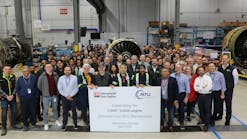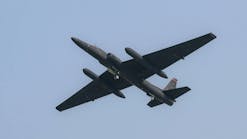FBO Report
Maintaining a Margin
FBOs work to keep ahead of rising fuel costs
By Jodi Richards
October 2004
As fuel prices remain at record highs, crude oil topping $40 abarrel, fixed base operators are feeling the pinch. AIRPORT BUSINESSmagazine recently spoke with FBOs to find out how they are handlingthe rising cost and what they're hearing from their customers. Fortunatelyfor many FBOs, they've been able to pass the increase onto customers without too much resistance.
For Ginna Reyes, general manager of Western Flight, Inc., based at McClellan-Palomar Airport in Carlsbad, CA, rising fuel prices have affected operations, despite this being a busy time of the year for the FBO. “For the month we are 30 percent over where we were last year,” says Reyes.
She says fuel prices are typically higher for this northern San Diego region airport because of geography. But, with prices reaching all-time highs the pinch is felt even more. “Because of our location, we pay higher costs for our fuel than anywhere else in California, on a wholesale basis,” Reyes explains. “And unfortunately, we have to pass it through to the customer because our operations cost just as much to run as everybody else’s. So our prices are a little bit higher.
“What we have found as a result of the fuel prices increasing, is that our avgas, fuel business is down. But our jet is actually up.” Reyes attributes this to leisure flyers not getting out as much. Less than ten percent of fuel sales at Western Flight are avgas.
Reyes says she has heard some complaints from customers regarding the rising cost of fuel, but adds that it’s something they’re seeing across the country. “I do continue to give the volume discounts,” says Reyes.
The cost increase has made it a challenge for Western Flight to maintain its profit margin; “[It’s] being squeezed,” she says.
“It’s hurt us because we have not been able to give the raises to our employees that we’ve really wanted to be able to give, and that we feel are warranted and needed. As a result, we’re starting to lose some of our valued, experienced employees.”
Western Flight is still able to offer some of the incentives it has all along, including complementary tee times and meals at the airport cafe. Reyes says this is one of the reasons fuel volumes have not suffered dramatically. She adds that the FBO is still offering Avtrip points “which we’ve found to be very successful.”
Reyes would like to say that she’s optimistic that fuel prices will come down, but says it doesn’t look like they will drop any time soon. “They may drop marginally, but it won’t be the kind of drops that we have seen in the past.”
When fuel prices began the steady climb upwards, Reyes explains, “I think we were like a lot of other aviation businesses, we tried to absorb it (the increase) for as long as we could because we didn’t want to have to pass it on to the customers. But it gets to a point where you just have to.
“It used to be that the trend with fuel was it would go up and then down, and then up and then down. We would try to only change our fuel prices maybe once or twice a year, accordingly... Even though we still try to keep the same price for as long as possible, it’s forced us to adjust it more frequently.”
Reyes says Western Flight has tried surcharges in the past, finding that customers are much more adverse to them. “People just don’t like to pay them.”
While there are three FBOs on the field at McClellan-Palomar, Reyes says, fortunately no one is “playing the cutthroat game” as far as fuel pricing. “We’re all in the same boat.”
Referencing a recent fuel survey for the San Diego region, Reyes says over the previous month, jet-A was up some 15 cents per gallon, on average, while 100LL (retail basis) was up some two cents.
Price Wars Don't Pay
In Medford, OR, Danny George, president of Jet Center MFR, says his FBO
has seen a 26 percent increase in the cost of jet fuel since 2002 (year
to date). “Which is not unique by any means,” he adds. The
George family has been operating the FBO here for some four decades.
According to George, the average uplift in Medford had been 242 gallons per aircraft. That has since dropped to 175 gallons per aircraft. “We feel it’s because of two things,” he explains. “They’re being price cautious, and they’re getting more fuel from their home base than what they would on the road.”
Like Reyes, George says he has had no choice but to pass the fuel price increase on to customers, but not the full 26 percent. “It’s been about 12 percent,” he says.
“It’s been very challenging, and to tell you the truth, we’ve learned a lesson. It doesn’t pay to go into price wars. We have to hold our margins and give super service — the best service we can possibly give, and hopefully customers recognize the value.”
George says the FBO is “constantly looking for ways to supplement traditional income coming into the FBO because the fuel margins are going away quickly.” As far back as 2000 and 2001, 60 to 65 percent of the FBO’s revenue was from fuel sales. Now, that number is closer to 35 percent. “The supplier’s cost has gone up quite a bit, less fuel is being flowed, and that’s affected us,” he says.
Jet Center MFR sells both jet-A and avgas. George says he has seen a decrease in the amount of traveling the leisure flyers are doing. “I believe that’s due to a rising cost in fuel,” he says. To counteract this trend, the FBO installed a self-serve island and is able to pass the savings of not using a fuel truck or manpower onto local flyers. “That’s helped our numbers stabilize,” he says, “but as far as the transient coming to the FBO, yes it has slowed.”
George adds that his customers are also quite understanding when it comes to the rising fuel costs. “It’s difficult for them,” he says, “but the customers will pay the price for the fuel and they understand it’s the suppliers and the current crisis they’re in.”
New Operation Challenges
Jetscape Services, LLC. is a relatively new addition to Fort Lauderdale
International Airport. Fully operational since February, Crystal Dukes,
accounts manager, says the FBO has found it challenging to deal with
rising fuel costs while also trying to establish a business. “The rising
cost has increased our retail price, which has deterred a lot of customers.
“We’re a brand new FBO so we’ve been trying to keep our retail price the lowest on the field. And therefore, of course, that makes a less cushion for the discounts, like a lot of FBOs do. We have a lower discount, but our retail price is lower.”
Dukes says the rising costs have hurt revenue. Combined with fuel prices, she says, the past couple months have been Fort Lauderdale’s slow season, which has also caused a drop in traffic. “It’s kind of put us in a jam for the past couple months,” she says. “When the prices really started to increase, we got hit with the slow season, so we don’t know if the gas prices are keeping customers away, or if it’s just the slow season.”
To attract new customers, Jetscape offers a special of $1.69 per gallon for first-time customers. “We want new customers to always come in and not necessarily just give us business, but bring more traffic to FLL in general.”
The majority of customers that come through Jetscape are understanding when it comes to fuel prices, says Dukes. “They understand that we’re in business too; we’re trying to make it as much as everybody else is.” She adds that “there’s not that much we can do” in regard to making the increase easier on the customers “We’ve been sticking more toward being very strong with the fees. We try not to tack on too many fees as far as landing fees and parking fees, and that sort of thing. But we have to stick to our prices.
“We used to give discounts depending on how much fuel you bought, but now we have to stick to the higher prices. We don’t like to do it, but that’s how we maintain our margin.”
Dukes explains there are losses the company just has to “swallow,” but they do try to make up the losses through “fees we can definitely get, as far as the hangar and ramp fees.”
At Jetscape, Dukes says 100LL prices have been more stable than jet-A in the past few months. “We’ve seen a dramatic increase in jet-A, but 100LL has pretty much stayed the same as far as price.”
FBO Vs. Charter
Dan Kilkeary, manager and sales director for L.J. Aviation, based at
Arnold Palmer Regional Airport (Latrobe, PA), agrees that rising fuel
costs are a concern for his operation, from both the FBO side and the
charter side.
“It’s definitely a concern,” he says. “On the FBO side, it’s sad, but you just have to pass through what the increases are.
“On the charter side, it’s a shame, but I don’t think it’s slowing business down at all, but the customers are used to just seeing a fuel surcharge. There’s really nothing we can do.”
Kilkeary explains that the FBO has a margin which it wants to achieve and the price of fuel fluctuates based on that margin. “We get new pricing on Tuesdays and the price fluctuates with it, it’s on a cost plus basis.”
While fuel costs are rising, Kilkeary says LTB is “one of those airports where people tend to fill up because they think it’s so reasonably priced compared to major metropolitan areas.
“I think people are definitely being judicious — they’re making sure they’re getting the best bang for the buck. And if they can tanker fuel out of here because they’re going someplace where fuel is another dollar a gallon more, they’re recognizing the value. That’s not to say that fuel’s not expensive here, but since we’re not in a major metropolitan area, I think that our fuel cost compared to what they are at more nationally known FBOs is a lot more cost-effective here. It’s still over $3 a gallon.”
Because L.J. has been able to stick to its margins, Kilkeary says it’s still offering volume discounts. “You have to give some type of incentive,” he says.
In regard to L.J.’s charter operation, Kilkeary says his staff is working very hard to get the best fuel rate when flying. “We do more phone calls now to FBOs to see what the fuel prices are than we ever have to make sure we’re getting a competitive rate,” he says. “We’re looking through all our contract fuel programs, trying to negotiate with the FBOs directly when we come in. All those things that we used to not have to do, we’re doing regularly now. So it’s adding another step. It’s taking more time.”
Kilkeary says he’s hopeful that the fuel prices will stabilize, but adds that there doesn’t appear to be any incentive for them to go down. “People are still flying, people are still paying. I definitely don’t think the prices go down as fast as they go up. When the cost of fuel goes down, you’re definitely not seeing it out on the road as much as you do when the price goes up. “





